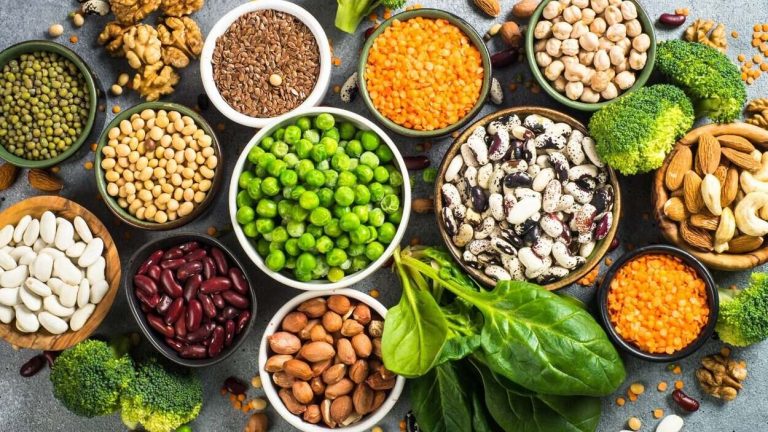Why Plant-Based Protein Matters in Our Diet
Plant-based protein is an essential component of a well-rounded diet, particularly for individuals looking to reduce their meat consumption. Protein is necessary for building and repairing muscles, supporting immune function, and sustaining energy levels. Choosing plant-based sources allows you to meet these needs without the saturated fat and cholesterol found in many animal products.
Beyond their protein content, many plant-based foods are packed with fiber, antioxidants, and important micronutrients. These nutrients aid digestion, promote heart health, and help regulate blood sugar levels. A diet rich in plant-based protein sources can contribute to overall well-being while reducing the risk of chronic illnesses.
Incorporating plant-based proteins into your meals does not mean sacrificing nutrition. A diverse mix of legumes, whole grains, nuts, seeds, and vegetables ensures that your body receives all the essential amino acids necessary for maintaining strength and vitality.
Legumes: Excellent Plant-Based Protein Sources
Legumes are among the best plant-based protein options due to their high protein content and impressive nutritional benefits. Beans, lentils, and chickpeas are staples in vegetarian and vegan diets, offering an affordable and versatile protein source. One cup of cooked lentils, for example, provides approximately 18 grams of protein, a value comparable to some meat servings.
In addition to protein, legumes are rich in dietary fiber, iron, and folate, all of which support digestion and blood health. Fiber plays a crucial role in maintaining gut microbiome balance and stabilizing blood sugar levels, making legumes a great choice for sustained energy throughout the day.
Legumes are easy to integrate into meals. Chickpeas can be tossed into salads or blended into hummus, black beans and kidney beans make excellent additions to tacos and soups, and lentils serve as a great protein boost in curries and stews.
Soy Products: Complete Plant-Based Protein
Soy is one of the few plant proteins that contain all essential amino acids, making it a complete protein source. Tofu, tempeh, and edamame are popular soy-based proteins that can be used in a variety of dishes.
Tofu is highly versatile and easily absorbs the flavors of marinades and seasonings. It can be added to stir-fries, blended into smoothies, or used as a meat substitute in various recipes. Tempeh, which consists of fermented soybeans, has a firmer texture and a nutty flavor, making it ideal for sandwiches, salads, and grilled meals.
Soy products also contain beneficial plant compounds called isoflavones, which have been linked to lower cholesterol levels and hormonal balance. Including soy in your diet can contribute to heart health and provide long-lasting energy without relying on animal-based protein.
Quinoa: Ancient Grain with Complete Amino Acids
Quinoa is an ancient grain that stands out due to its high protein content and status as a complete protein. Unlike most grains, which lack one or more essential amino acids, quinoa provides all nine, making it particularly valuable in plant-based diets.
In addition to protein, quinoa is rich in fiber, magnesium, and iron, nutrients that are essential for energy production and red blood cell function. It is naturally gluten-free, making it an excellent grain choice for individuals with gluten sensitivities or celiac disease.
Quinoa is easy to prepare and can be used in a variety of meals. It serves as a great base for grain bowls, can be mixed into salads for added texture, or substituted for rice in stir-fries and other dishes.
Mushrooms: Flavorful and Nutritious Protein Source
Mushrooms provide a modest amount of protein while offering essential amino acids and powerful antioxidants. Shiitake, portobello, and cremini mushrooms are among the most nutrient-dense varieties, making them a valuable addition to plant-based diets.
One of the biggest advantages of mushrooms is their ability to mimic the texture of meat, making them a great ingredient for plant-based burgers, tacos, and pasta dishes. Their umami flavor enhances meals, reducing the need for added salt or artificial flavorings.
Additionally, mushrooms contain beta-glucans, compounds known for supporting immune function and promoting overall health. They are a great way to add depth and nutrition to meals while contributing to protein intake.
Nuts & Seeds: Small but High in Protein
Nuts and seeds are protein-rich foods that also provide healthy fats, fiber, and essential vitamins. Almonds, walnuts, and cashews are packed with nutrients, while seeds like chia, flax, and hemp offer a concentrated source of protein and omega-3 fatty acids.
Hemp seeds, in particular, are a standout choice, delivering about 10 grams of protein per three tablespoons. These seeds are also rich in essential fatty acids that promote brain health and reduce inflammation in the body.
Nuts and seeds can easily be incorporated into daily meals. They can be blended into smoothies, sprinkled over oatmeal or salads, or made into nut butter for a convenient and nutritious spread.
Leafy Greens: Vegetables with Protein Content
Although leafy greens contain less protein than legumes or soy, they still contribute valuable nutrients to a balanced diet. Vegetables like spinach, kale, and bok choy provide moderate amounts of protein while also offering calcium, iron, and antioxidants.
Spinach, for example, contains about 5 grams of protein per cooked cup and is a great addition to meals. Kale is another nutrient-dense option that supports immune function and cardiovascular health.
Leafy greens can be included in smoothies, sautéed as a side dish, or used as a base for salads. Their combination of protein and vitamins makes them a great addition to a plant-based diet.
Whole Grains: Nutrient-Dense Oats, Brown Rice & Barley
Whole grains offer a nutritious source of protein, fiber, and essential minerals. Oats, brown rice, and barley are excellent plant-based protein sources that also provide sustained energy.
Oats contain around 6 grams of protein per cup and serve as a filling breakfast option. They help lower cholesterol and support gut health due to their high fiber content. Brown rice and barley are also protein-rich grains that can be used in a variety of savory dishes.
Incorporating whole grains into meals is easy. Oats work well in overnight oats, granola, and porridge, while brown rice and barley can serve as side dishes or be mixed into soups and stews.
Combining Plant-Based Proteins in Your Daily Diet
To ensure adequate protein intake, it’s beneficial to combine different plant-based protein sources. Mixing legumes, grains, and nuts provides a complete amino acid profile, helping to maintain muscle mass and overall health.
Meal prepping is a great way to incorporate plant-based proteins consistently. Preparing quinoa bowls, lentil soups, or tofu stir-fries in advance ensures that you always have high-protein meals ready to go.
Adopting a plant-based diet doesn’t mean sacrificing nutrition. With mindful planning and diverse food choices, it’s easy to meet daily protein needs while enjoying delicious and satisfying meals.




